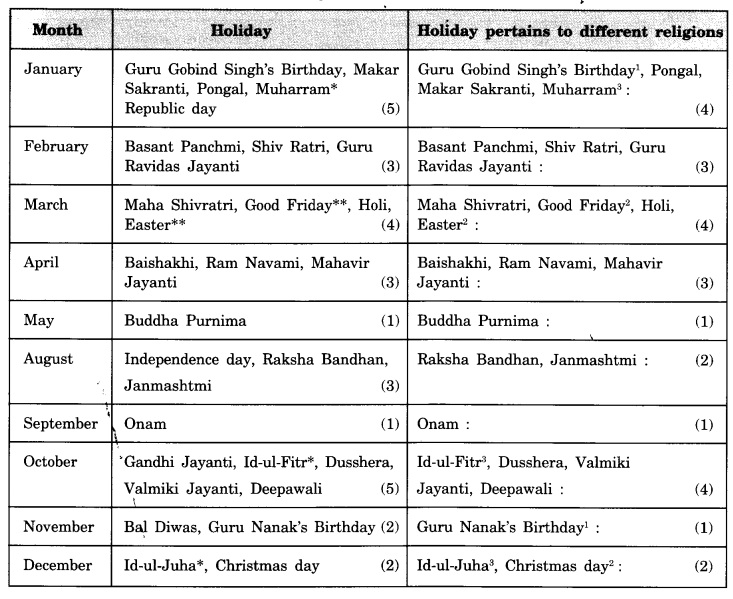NCERT Solutions for Class 8 Social Science Civics Chapter 2 Understanding Secularism
These Solutions are part of NCERT Solutions for Class 8 Social Science. Here we have given. NCERT Solutions for Class 8 Social Science Civics Chapter 2 Understanding Secularism
Question 1.
List the different types of religious practice that you find in your neighbourhood. This could be different forms of prayer, worship of different Gods, sacred sites, different kinds of religious music and singing, etc. Does this indicate freedom of religious practice?
Answer:
| Religion | Different forms of prayer | Worship of different Gods | Sacred sites |
Different kinds of religious music & singing |
| Hindu | Pooja, Meditation |
Krishna, Ram, Shiva, Vishnu | Haridwar, Mathura |
Bhajan, Kirtan |
| Muslim | Namaj | Allah | Mecca, Madina Ajmer Nizamuddin (Delhi) |
Qawwali, Ajan |
| Sikh | Ardas, Matha tek |
Guru Nanak | Golden Temple Amritsar, Various Gurudwaras of Delhi, Hemkunt Sahib | Shabad kirtan |
| Christian | Prayer, Meditation | Jesus/Mother Mary | Church Jerusalem, Rome |
Holy song, Hymns Carols |
Question 2.
Will the government intervene if some religious group says that their religion allows them to practice infanticide? Give reasons for your answer.
Answer:
Yes, the government will intervene if some religious group says that their religion allows them to practice infanticide because:
- According to the law, killing a human being is illegal.
- Such an act is also against human rights.
Question 3.
Complete the following table:
| Objective | Why is this important? | Example of a violation of the objective |
| One religious community does not dominate another. | ||
| The State does not enforce any particular religion nor take away the religious freedom of individuals. | ||
| That some members do not dominate other members of the same religious community. |
Answer:
| Objective | Why is this important? | Example of a violation of this objective |
| One religious community does not dominate another. | To maintain Harmony. To avoid discrimination. |
In Hindu schools, in the case of admission of Muslim children, there is more resistance. |
| The State does not enforce any particular religion nor take away the religious freedom of individuals. | Because we are citizens of a secular state, where all religions are equal in the eyes of laws. | Religious festivals are celebrated in private schools. Demolition of temples in Kashmir Valley. |
| That some members do not dominate other members of the same religious community. | Allow freedom in equal measure. | In many circumstances in Hinduism, the lower Hindu caste is being dominated by upper-caste Hindu till today. |
Question 4.
Look up the annual calendar of holidays of your school. How many of them pertain to different religions? What does this indicate?
Answer:
Annual Calendar of Holidays

- Among 25-30 annual holidays, 22-25 holidays pertain to different religions.
- It indicates that there is a holiday or religious festival of every religion. So everyone can celebrate their own festival according to their own tradition. Religious festivals are not celebrated in schools.

* Month may vary
- Sikh
- Christian
March or April - Muslims
Question 5.
Find out some examples of different views within the same religion.
Answer:
| Religion | Different views |
| Hindu | Arya Samaj, Sanatan Dharm, etc. |
| Jainism | Shwetamber, Digambar |
| Sikh | Sant Nirankari, Khalsa, Radhaswami |
| Muslims | Shiya, Sunni, Ahmadia, Vora, etc. |
| Christian | Roman Catholic, Luthern Church, Orthodox, Protestant |
Question 6.
The Indian State both keeps away from religion as well as intervenes in religion. This idea can be quite confusing. Discuss this once again in class using examples from the chapter as well as those that you might have come up with.
Answer:
Indian State keeps away from religion because if the major religious group has access to State power then it could be easily applicable the power and financial resources against the persons of other religions. The majority could quite easily prevent minorities from practicing their religions.
Question 7.
This poster highlights the need for ‘Peace’. It says, “Peace is an ever-ending process….. It cannot ignore our differences or overlook our common interests.” Write in your own words what you think the above sentences are trying to convey? How does it relate to the need for religious tolerance?

Answer:
This poster conveys a message for the establishment of peace in society. The message explains that peace is a long-cherished process. But in this process, we cannot ignore the differences or overlook our common interests. It means peace can be brought only after establishing coordination between the common interests. Religious tolerance is the most sensitive issue in this sense. Note: Students are suggested to design their own posters on religious tolerance.
We hope the NCERT Solutions for Class 8 Social Science Civics Chapter 2 Understanding Secularism, help you. If you have any query regarding NCERT Solutions for Class 8 Social Science Civics Chapter 2 Understanding Secularism, drop a comment below and we will get back to you at the earliest.